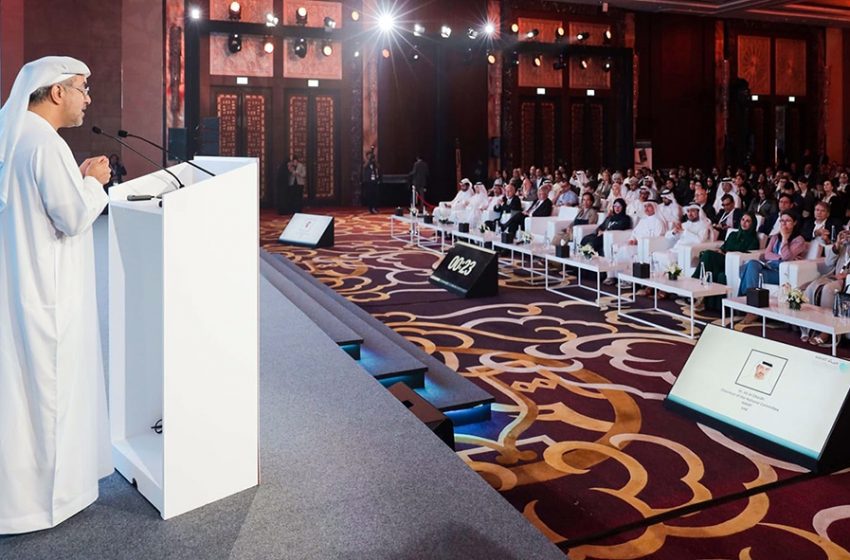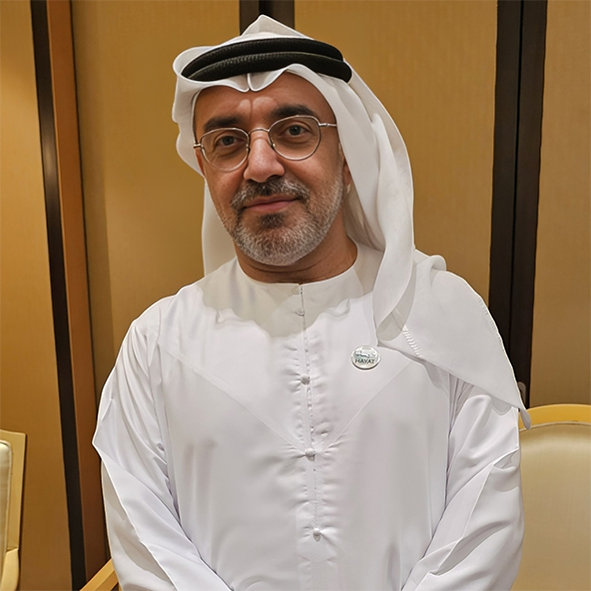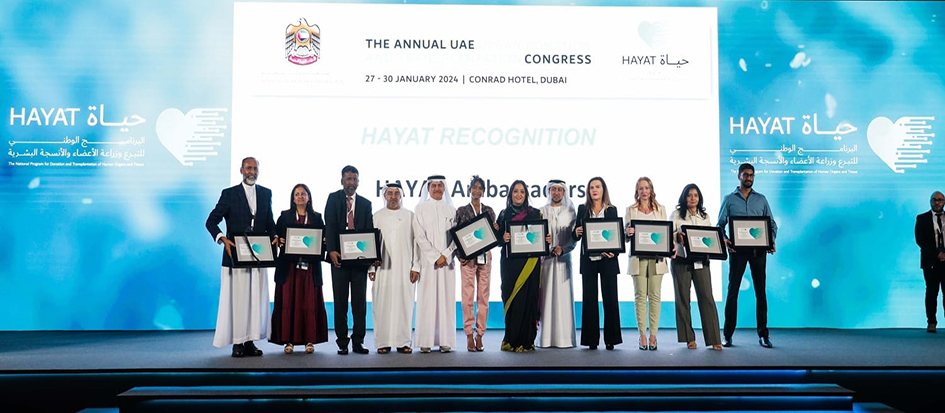UAE Organ Donation and Transplantation Congress 2024 kicks off in Dubai with over 8,000 global experts

Dubai Jan,2024
The UAE Organ Donation and Transplantation Congress 2024 commenced today in Dubai, bringing together more than 8,000 experts and specialists, both in-person and remotely. Organised by the Ministry of Health and Prevention (MoHAP), the Department of Health – Abu Dhabi, and the Dubai Health Authority (DHA), the event will run for four days from January 27 to 30.
Representatives from various health authorities, government entities, and the private healthcare sector are taking part in the event as well as other participants from around the world who will engage in discussions, presentations, and lectures featured throughout the conference.
During the four-day scientific sessions, speakers will delve into various aspects of organ donation and transplantation, including the role of organ donation in mitigating chronic organ failure cases, innovative strategies to address challenges, the outcomes of organ transplantation, and how they contribute to enhancing the quality of life for recipients.
The conference will also look into ways to reduce the burden of chronic diseases and discuss the importance of education and capacity-building in the fields of donation and transplantation, as well as regional and international cooperation in this domain.
Hayat Programme
The congress will shed light on the achievements of “Hayat,” the National Programme for Donation and Transplantation of Human Organs and Tissue, operating under the Ministry of Health and Prevention. “Hayat” has garnered international recognition for its remarkable performance, becoming the world’s best and fastest-growing programme in organ donation.
This accolade is attributed to the impressive increase in the number of donors after death per million population, with the UAE achieving a remarkable 417% growth over the past five years, according to the Congress of the International Society for Organ Donation and Procurement (ISODP).
Moreover, the conference will highlight the significant strides made in promoting the culture of organ donation among the citizens and residents of the UAE, recognizing it as a noble humanitarian endeavour that embodies the values of sustainability and contributes significantly to realising the objectives of the Quality-of-Life Index.
“Hayat” has been remarkably successful, showcasing community solidarity and tolerance. It has played a pivotal role in giving patients in need of organ transplants renewed hope for a new life and enabling donors to exercise their right to donate and save the lives of others. Over 52 different nationalities have participated in and reaped the benefits of the programme, taking advantage of the nation’s proficient healthcare system and its cutting-edge technological resources.
Raising awareness of organ donation
Abdullah Ahmed Ahli, Acting Assistant Under-Secretary for the Support Services Sector, emphasized that MoHAP together with other health authorities are keen to foster a culture of organ donation within the community through launching community campaigns and organising international conferences and events. “We will spare no effort to develop sustainable solutions for patients suffering from various critical conditions like cancer, heart disease, pulmonary failure, cirrhosis, and kidney failure,” Ahli added.
He highlighted that organ transplantation not only offers a path to full recovery but also significantly improves the quality of life for recipients. He noted that Hayat Programme is a humanitarian initiative designed to encourage organ donation. It’s a heroic act that embodies the essence of humanity, offering individuals a fresh chance at life while reinforcing the established culture of organ donation within society.
Advanced infrastructure & capabilities
Dr. Rashed Al Suwaidi, Executive Director of the Healthcare Workforce Planning Sector at the Department of Health – Abu Dhabi said: “Abu Dhabi is consistently strengthening its capabilities in organ donation and transplantation through collaborative efforts with partners across the Emirates, operating within the framework of the National Programme for Organ Donation and Transplantation ’Hayat’. This initiative aims to safeguard the health and well-being of communities, cementing Abu Dhabi’s position as a leading global healthcare destination. We also recognise the significance of unifying our efforts to advance the field of organ and tissue donation and transplantation. This necessitates international collaboration to broaden networks and databases of both organ donors and recipients, along with the sharing of knowledge and expertise among medical professionals. We eagerly anticipate that this crucial event will contribute significantly to realising these objectives.”
Latest medical equipment in the world
Dr. Marwan Al Mulla, CEO of the Health Regulation Sector at the Dubai Health Authority, stated that the United Arab Emirates has succeeded in establishing its own approach to organ and tissue donation and transplantation. This has been achieved through a comprehensive set of legislations, regulations, and organized procedures, as well as the national “Hayat” program, which supports the concept of organ donation and is aligned with the value system of UAE society. Additionally, the available state-of-the-art medical facilities, exceptional healthcare environment, and other factors contribute to the success and distinction of the UAE in this vital health field.
Dr. Mulla confirmed that the Dubai Health Authority plays a vital and prominent role in this field, serving as a strategic and effective partner in consolidating efforts that support the UAE’s vision for healthcare, specifically in the field of organ donation and transplantation.
He emphasized that this conference demonstrates the advanced and distinctive path the country has reached, highlighting the nation’s determination to make its mark in this vital field.
Significant Impact

Dr Ali Abdulkarim Al Obaidli, Chairman of the National Committee for Organ Transplantation, highlighted that the congress has successfully attracted an elite group of global experts and specialists, something which reinforces the UAE’s standing and remarkable achievements in the field of organ transplantation. He emphasized the importance of international cooperation, as the integration of organ donation and transplantation services aligns with WHO principles on regional integration.
Al Obaidli stressed that the insights and outcomes from the gathering are expected to make a significant impact, enhancing collaborative efforts, raising awareness about the importance of organ donation in line with international standards and practices, and providing care to patients suffering from organ deficiencies.

Dr Al Obaidli also noted that organ donation not only brings renewed hope to patients and their families but also contributes to the overall health, safety, and quality of life in the community.
Hayat International Award
The conference not only provides a platform for various local and international hospitals to share their experiences but also promotes community engagement in organ donation. It aims to uphold the highest quality standards in the field and recognize the exceptional contributions of hospitals, medical centers, and relevant organizations at local, regional, and international levels to advance both living and deceased organ transplantation.
It is important to highlight that many organ transplants, specifically 62%, take place in high-income countries, while 28% occur in middle-income countries. Unfortunately, low-income countries lag, accounting for less than 1% of organ transplants. Moreover, it should be noted that the number of available organ donors worldwide falls significantly short of the global demand, estimated to be less than 10%.
Kidney transplantation is not only preferable for patients but also more cost-effective for health systems compared to dialysis. Despite this, there is a vast gap between the number of kidney transplants performed annually (around 100,000) and the number of patients undergoing dialysis, which exceeds 5 million each year.
To address this disparity and improve the situation, international collaboration is of paramount importance. It is imperative to harmonize efforts and revise healthcare legislation to promote regional self-sufficiency in organ transplantation, implement innovative solutions and meet the growing demand for life-saving procedures.
Participation categories encompass innovation and creativity, honouring hospitals, medical centres, and organ donation agencies for innovative solutions that enhance organ and tissue donation and transplantation outcomes. Additionally, there’s a category for committed hospitals, which have successfully executed at least one deceased donation or are in the process of doing so, demonstrating a strong commitment to implementing best practices and key performance indicators (KPIs) in organ donation for sustainable growth.
Another category acknowledges hospitals that have achieved the highest growth in organ donation over the past three years, and there’s also recognition for active distinguished hospitals with the highest potential for organ donation.
As part of the ongoing commitment to advancing donation and organ transplantation efforts globally, there is a study underway to explore the possibility of launching international awards in the future to support and recognize outstanding achievements in the field after identifying challenges, evaluating various participations, and gathering insights from experts who are part of the conference.
Areas of discussion
The conference zeroes in on various challenges and opportunities associated with organ donation, both from living donors and posthumous donations. Key topics include strategies to boost donation rates and the legal and ethical aspects involved. It also emphasizes the importance of collaboration between healthcare professionals, government entities, and community organizations in this field.
Additionally, the event will review experiences of certain countries and delve into the latest technological developments in organ donation and transplantation and will feature discussions on cutting-edge innovations like perfusion machines, organ recipient identification systems, and various aspects of care after a transplant.
Unified national efforts
Established in September 2020 under the auspices of the Ministry of Health and Prevention, the National Centre to Regulate Human Organs and Tissues Transplantation aims to centralize and streamline organ transplant activities across the UAE. The centre’s primary objectives include developing comprehensive programmes for both the prevention and treatment of organ deficiencies, as well as registering cases. It is also involved in formulating protocols for the transfer and transplantation of organs and tissues, overseeing organ preservation, and managing distribution operations.
Furthermore, the centre collaborates with various health authorities to enhance the skills and qualifications of medical professionals in this specialized field. One of its key objectives is to foster a culture of organ and tissue donation within the community, emphasizing the profound impact of donation A single donor has the potential to save and transform the lives of up to eight individuals.
Hayat programme provides an opportunity for all UAE residents aged 21 and above to express their willingness to donate their organs after clinical death. Organ transplantation represents a permanent and effective solution for many patients, offering positive outcomes for both donors and recipients.
“Hayat” programme offers all UAE residents aged 18 and above the opportunity to express their willingness to donate organs after their passing. Organ transplantation stands as a permanent and effective solution for many patients, and it symbolizes tolerance, coexistence, and human brotherhood, leaving a positive impact on society.
Organ transplantation is the most effective treatment for patients with organ failure, aligning with the United Nations Sustainable Development Goals aimed at reducing premature mortality and advancing universal healthcare. The global rise in chronic diseases leading to organ failure underscores the need for international collaboration to address these challenges.






